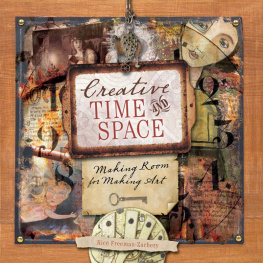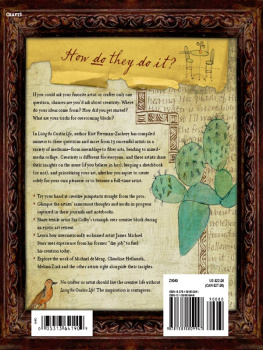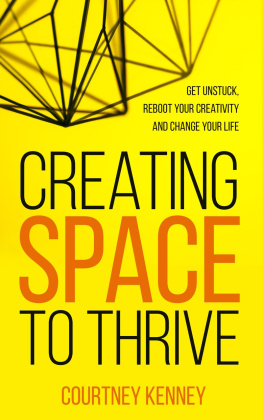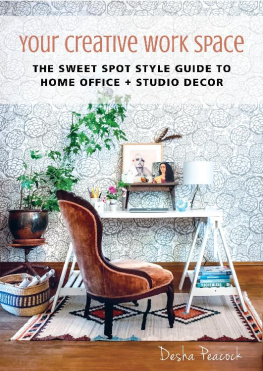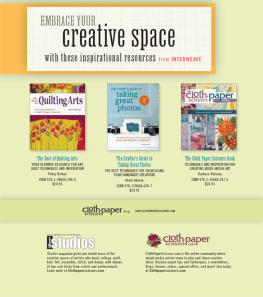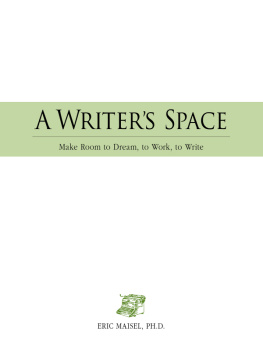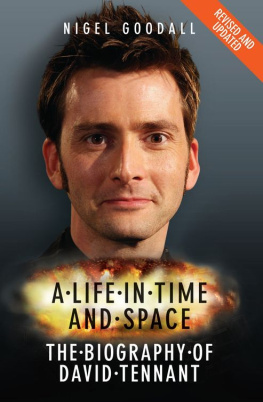Acknowledgements
Where to start when you have so many people to thank? First, of course, I heartily thank the artists who contributed not only their art but their ideas, tips, and encouragement. They answered dozens of my nosy questions and met difficult deadlines, all in the spirit of sharing what they've discovered so the rest of us can make the most of our own creativity.
Thank you to my two terrific editors, Tonia Davenport and Jessica Strawser, whose vision and hard work made this book concrete. They and the team at North Light Books are simply the best.
Thanks to all the wonderful, fabulously talented, and hilariously funny people who take time out of their days to stop by my blog. They have created the artistic community I've always wanted. When I started my blog, I had no idea what wonderful people would show up to entertain me, cheer me on, offer ideas and information, and encourage me to laugh every day. Y'all are fabulous!
Thank you to Karen, Paula, Roz, and Wendy: the members of WWSF (loosely translated Women Who Say a Very Bad Word That Would Make Your Mother Cringe). These are the smartest, funniest, most opinionated women on the planet, and I'm lucky to know them. For any question I could possibly have, one of them is sure to know the answer, whether I'm asking about gouache or Goya, math or menopause, or the name of that animal that isn't a raccoon.
And, as always, I owe everything to my husband, Earl. To say he's supportive sounds as if he merely puts up with me. The truth is that he thinks everything I do is marvelous (well, most everything) and thinks I'm funny (most of the time) and suggests ideas and approaches that I hadn't even thought of. He retired at 55 and took over all of the cooking and house-work (not that I ever did a whole lot of either of those) to give me more time to create. Any wonder why my books are dedicated to him? I think not.
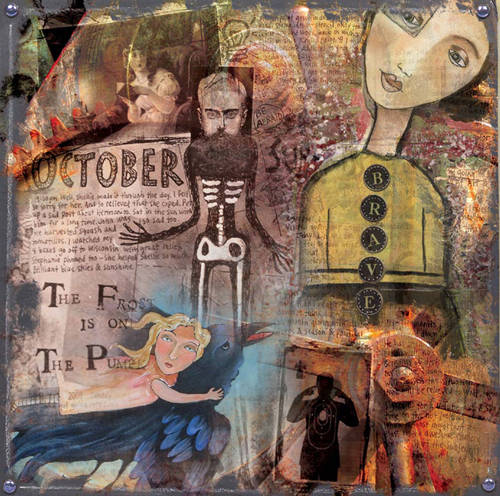
Introduction
Perhaps creating keeps you young. There is no time when you are in the creating space. The more of this world's time that you spend there, the less you age.
David Mack, Kabuki: The Alchemy
F rom the time I was a little kid until well into adulthood, I kept my Important Stuff in a green Army portable field desk. It held pens and paper and notebooks and, later on, art supplies. Wherever I moved, the desk moved with me; and everything I needed was neatly stored in its drawers.
Today I work at one of three long tables in my office (one of three rooms in our house devoted to writing and making art). I look at my old field desk (tucked away in storage) and marvel that, for so many years, everything I needed fit into a space smaller than a suitcase.
What happened to make me need so much more space? And what happened to make me feel so pressed for time? I can remember being a kid back in the days when that Army desk held a pink flowered notebook and a box of crayons and feeling summer afternoons stretching out into infinity. Not anymore. Time, just like space, has become a mystery to me. Is it a mystery for you, too?
You know the feeling: You're working on something that's finally coming together for you. Or maybe it's not, not quite yet, but you can sense that it's getting there. You're in the zone, deep in concentration, making the connections. Finally you come up for air, take a little break. You glance up at the clock and do a double take. Hours have passed without your being aware of it. The afternoon has slipped into evening. Isn't that a marvelous feeling? And don't you wish you could get there more often to that timeless space where you can immerse yourself in your work without having to watch the clock? It's just like it was when you were a kid and had those long, long afternoons in July stretching out before you, timeless and endless and full of possibility.
We all battle time. We think we need more, we wish it would pass more quickly, we postpone doing things in the hope that time will slow down enough that we never actually have to tackle them. Artists, especially, have a complicated relationship with time. And when we think about time, we automatically think about space. At least I do. Time and space are two things I'm always coveting. Do you ever think about how much more creative you would be if you had just a couple more hours in every day? Or how much more you could get done if you had your very own studio where you could leave everything just as it was at the end of the day and walk out and close the door?
You are, of course, far from being alone. In fact, you're in very, very good company, indeed. There may be a few artists somewhere who have all the time and all the space they could possibly need, but I sure haven't talked to them. The artists I talk to even the ones who make art full time in custom-designed studios all could use just a little more.
Time and space are always issues, no matter what creative work you do. And when we talk about time and space, we aren't talking just about clock time and actual physical space. That would be the easy part. If that were all there was to it, we could cut out all the chores and errands and let the house and yard work pile up in order to gain a few extra hours a week; and we could scrimp and save and add a little room onto the back of our house where we could actually go to paint.

